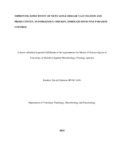| dc.description.abstract | Several factors contribute to lack of effective antibody response after Newcastle disease (ND) vaccination in indigenous chicken. Stress has been shown to be one of them and parasites are thought to play a role in inducing stress. Since, in other studies, chicken in Mbeere sub-county of Embu county, Kenya, have been shown to carry heavy loads of various types of parasites, this study was carried out to establish the extent at which this parasitism affects antibody response to ND vaccination. This study also endeavored to establish effect of parasite control on production of the indigenous chicken. Baseline data on chicken productivity, farmer demography, quality of eggs produced by the chicken in the area, and ND antibody levels in the birds (as indication for endemicity of the disease in the area) were also collected.
The study was carried out in 3 phases, using chicken from the same study area – Mbeere. Phase 1 involved collection of data on: chicken productivity, egg-quality, and owner demography through administration of questionnaire to seventeen households in the area. Eggs were purchased from the same households that questionnaires were administered and the egg quality tested, with respect to egg weight, shape and shell hardness. Thirty four eggs were purchased and examined. Phase 2 involved establishment of data on ND antibody titer levels in the chicken for 2 seasons – wet and dry. For each of the two seasons, serum samples were collected from 24 chicken of all ages and sexes for determination of ND antibody titers. The serum samples were tested using hemagglutination inhibition test. In Phase 3, effect of selective parasite control on the chicken‟ antibody response to ND vaccination, and productivity of the birds, as measured by weight gains, were studied. Seventy two chicken, from a population that was confirmed to be xvii
infected with ecto- and endo-parasites, were bought and divided into 8 groups which were variously treated for parasites. Groups 1 and 8 were controls, while Groups 2 and 5, 3 and 6, 4 and 7 were duplicates that were treated for endo-parasites only, ecto-parasites only and for both endo- and ecto-parasites, respectively. Groups, 5, 6 and 7 were also vaccinated with ND vaccine; the duplicate unvaccinated pair groups served as respective controls. Emphasis of the treatment was on nematodes and cestodes. Thus, birds in all groups except Group 8 were purposively treated for coccidiosis, so as to remove their influence on the immune response; Group 8 serving as overall control group. After vaccination, all the birds were monitored serologically weekly for ND antibody titers for a period of six weeks using hemagglutination inhibition test. As the birds were bled for sera, their respective weights were taken and recorded.
The analysis of the questionnaires showed that all the households interviewed had indigenous chicken, of all ages and sexes, reared on a free-range system. The birds played a significant role in economic, social and cultural affairs of the households. Farmers were aware of existence of parasites in and/or on their chicken, and ND seriousness but 76.5% of farmers interviewed did not treat their chicken against parasites nor vaccinate against ND. The eggs examined were found to be of good quality.
All the chicken (all ages and sexes) had ND titers. The titers were significantly higher in wet than in the dry season (p<0.05). The percentage of chicken with protective titer (24 ) were 100 in wet season and 83 in dry season. The continued presence of ND antibody titers in the study chicken indicated endemicity of the disease in the area.
The vaccinated groups 5, 6 and 7 showed a significant rise (P<0.05) in ND antibody titer from the start to the end of the experiment, compared to responses of the respective unvaccinated
groups 2, 3 and 4. From the 3rd week post vaccination up to the end of the experiment, group 7 had a significantly higher antibody titer (P< 0.05) than the other 2 vaccinated groups, 5 and 6. Titers of all unvaccinated groups (1, 2, 3, 4 and 8) continuously dropped over the experimental period. There was no significant difference in weight gain among the different groups after vaccination (P>0.05).
In conclusion, ND was confirmed to be endemic in study area, as shown by the occurrence of high levels of antibodies to ND during both the dry and wet seasons. Chicken parasite control improved immune response to ND vaccination. Chicken-owners are, therefore, encouraged to protect their birds through ND vaccination. This will be more effective if farmers practiced total parasite control before vaccination. This study, however, did not show significant difference in weight gains between the different test groups, as expected. Further research needs to be carried out to check the effect of parasite control on productivity of village chick. | en_US |

